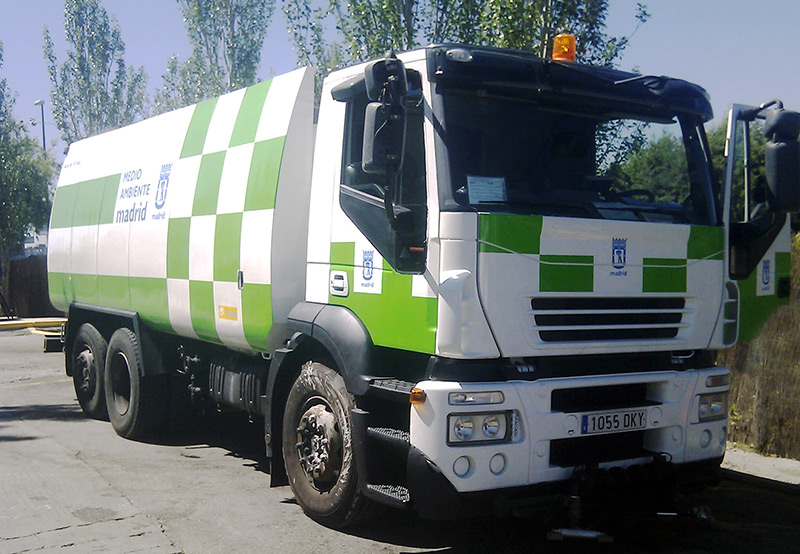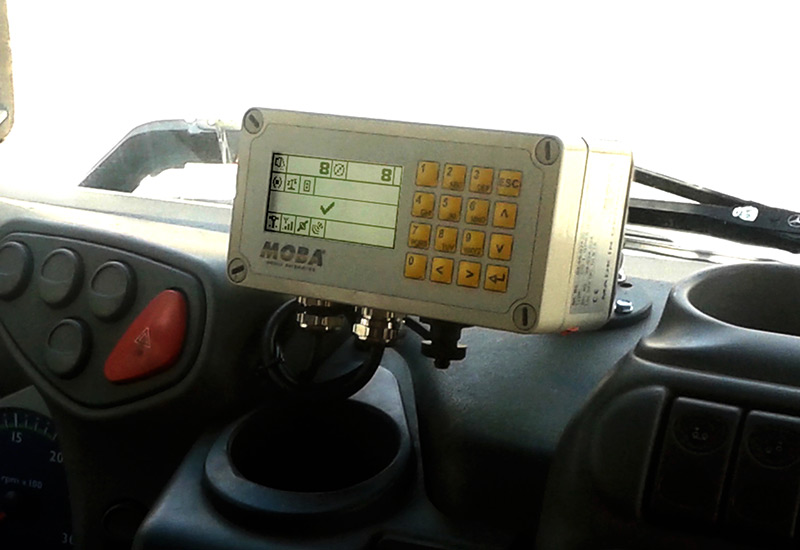With its more than three million inhabitants, the metropolis is striving to use new technologies to make the city more environmentally friendly, more energy efficient and cleaner, and more generally to raise overall quality of life in the city. One component of this effort is the city's street cleaning service. And it was in this area that MOBA technology was found to be the right solution.
With its narrow streets, tall buildings and very high traffic volumes, Madrid's city centre does not present an easy streetscape for the task of city cleaning. Indeed it is in precisely such large cities as Madrid that the faster, more efficient and well-planned deployment of street cleaning machines is needed to achieve the desired result – namely clean city streets – at the same time as avoiding straining the patience of street users too severely.
OPTIMIZED VEHICLE DEPLOYMENT THANKS TO GPS AND GOOD COMMUNICATION
That is why Ferrovial, the company entrusted by the city to carry out its street cleaning, is committed to the very latest technologies, as demanded by the Smart City concept. Ferrovial has equipped more than 350 vehicles with MOBA Mobile Automation AG technologies. Using this high-tech equipment each individual vehicle can be located at all times using GPS. This allows vehicles to be deployed flexibly, reducing down time and avoiding long detours, thus increasing their productivity. This makes fleet management substantially easier and more efficient, while networking allows the smooth running of the city's street cleaning. In addition, an audio system allows the dispatch centre to communicate directly with each individual driver. "This saves us a lot of money that we would otherwise have had to put into an ultra-shortwave radio system. And with it we no longer have to provide a telephone for each driver: and we can be sure it is used only for work-related telephone conversations, as users can dial only pre-set numbers", explains Carlos Martín, Ferrovial's Director of Technology.
About 50 of the vehicles have been equipped with an additional communication computer, which allows its users to record incidents during their deployment. When, for example, a street cannot be cleaned because it is blocked off by parked vehicles, the computer sends the data in real time to the Internet-based MAWIS U2.0 fleet management software located at Ferrovial's operations centre. These data can be read by the relevant person in the office at any time, who can thus respond quickly and flexibly to such situations as vehicle breakdowns or blocked streets, adjusting the deployment plan for his or her vehicles appropriately.
SENSOR DATA AS PROOF OF WORK
In addition, the MOBA system records the incoming signals from the sensors which relate the work situation of the relevant machine, showing whether the machine is simply travelling, is sweeping the street, or cleaning the road surface using water. "For us these data provide us with a proof of work completed. Because the contracts we have with the city of Madrid set out our duties very precisely. The data allow us to prove that we are completing our tasks according to contract", explains Carlos Martín. Because our business can face severe financial penalties if we fail to fulfil our contractual duties. Ferrovial does not just obtain proofs of work completion from the system, it also uses it to continuously optimize how it deploys its machines. Ferrovial can use this data to evaluate and improve the routes and deployment plan of each individual machine. It also allows us to substantially improve and simplify overall fleet management, as each machine can be deployed far more efficiently. "We're more than happy with the technology. We deploy our machines all over the city and our ability to record their positions and to communicate with them works seamlessly everywhere, whether they're working in narrow streets surrounded by high buildings or on the city's broad Avenues, says Carlos Martín. Ferrovial's MAWIS U2.0 software, in which all data are saved and managed, is connected up with the Madrid Smart City Platform to allow the municipality to use the data too. That is how the system actively contributes to coming another step closer to the goal of making Madrid a Smart City.


